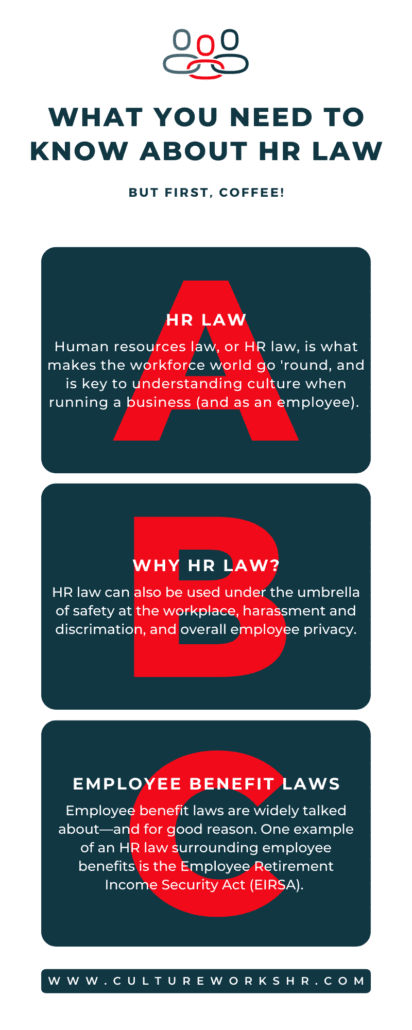What You Need to Know about HR Law… But First, Coffee!
CULTURE CONNECTIVITY FOR YOUR PURPOSE, PEOPLE AND PROCESSES.
Table of Contents
Toggle
CULTURE CONNECTIVITY FOR YOUR PURPOSE, PEOPLE AND PROCESSES.
You might hear the phrase “HR law” and want to run for the hills. But don’t fret, it’s not as scary as it sounds! Human Resources law is what makes the workforce world go-’round, and is key to understanding culture when running a business (and as an employee).
HR law runs under the term Human Resource Management (HRM) and is “the function that assists organizations in achieving goals by obtaining and maintaining effective employees.”
Through HRM, there are many laws to follow and use as a guideline for your long-term HR culture and implementation.
HR Law is, “related to Labor and Employment law and encompasses the various laws and regulations specific to HR professionals. It deals with the issues that HR professionals must contend within the majority of their work functions, predominantly in overseeing and managing duties related to hiring, firing, employee benefits, wages, paychecks, and overtime.”
HR Law can also be used under the umbrella of safety at the workplace, harassment and discrimination, and overall employee privacy.

Some of the primary HR regulations should be known across the board to help your company culture be its best. These HR laws can be categorized into:
These are broad topics and have many different applications– so let’s focus on employee benefits laws.
Employee Benefit Laws
Employee benefit laws are widely talked about, for good reason. A company wants to create the best environment to offer employees, including benefits with proper paid time, sick leave, life insurance, retirement benefits, and health insurance (to name a few). One example of an HR law surrounding employee benefits is the Employee Retirement Income Security Act (ERISA).
According to the U.S. Department of Labor, “ERISA requires plans to provide participants with plan information including important information about plan features and funding; provides fiduciary responsibilities for those who manage and control assets; requires plans to establish a grievance and appeals process for participants to get benefits from their plans, and gives participants the right to sue for benefits and breaches of fiduciary duties.”
Does this topic intrigue you? If so, you might want to consider looking into our monthly “Laws and Lattes” event. (And if HR Law doesn’t interest you, we’re sure lattes do!)
Practical steps you can take to make your company culture (and yourself) even better.
Signup for our newsletter below to stay up-to-date on our latest HR news & insights!
Mon-Fri: 7:00-4:00
Sat: Closed
Sun: Closed
© 2021 Culture Works – all rights reserved
site design by digitalstoryteller.io
© 2021 Culture Works – all rights reserved
site design by digitalstoryteller.io
This site uses cookies. By continuing to browse the site, you are agreeing to our use of cookies.
Accept settingsWe may request cookies to be set on your device. We use cookies to let us know when you visit our websites, how you interact with us, to enrich your user experience, and to customize your relationship with our website.
Click on the different category headings to find out more. You can also change some of your preferences. Note that blocking some types of cookies may impact your experience on our websites and the services we are able to offer.
These cookies are strictly necessary to provide you with services available through our website and to use some of its features.
Because these cookies are strictly necessary to deliver the website, refusing them will have impact how our site functions. You always can block or delete cookies by changing your browser settings and force blocking all cookies on this website. But this will always prompt you to accept/refuse cookies when revisiting our site.
We fully respect if you want to refuse cookies but to avoid asking you again and again kindly allow us to store a cookie for that. You are free to opt out any time or opt in for other cookies to get a better experience. If you refuse cookies we will remove all set cookies in our domain.
We provide you with a list of stored cookies on your computer in our domain so you can check what we stored. Due to security reasons we are not able to show or modify cookies from other domains. You can check these in your browser security settings.
These cookies collect information that is used either in aggregate form to help us understand how our website is being used or how effective our marketing campaigns are, or to help us customize our website and application for you in order to enhance your experience.
If you do not want that we track your visit to our site you can disable tracking in your browser here:
We also use different external services like Google Webfonts, Google Maps, and external Video providers. Since these providers may collect personal data like your IP address we allow you to block them here. Please be aware that this might heavily reduce the functionality and appearance of our site. Changes will take effect once you reload the page.
Google Webfont Settings:
Google Map Settings:
Google reCaptcha Settings:
Vimeo and Youtube video embeds:
The following cookies are also needed - You can choose if you want to allow them:
You can read about our cookies and privacy settings in detail on our Privacy Policy Page.
